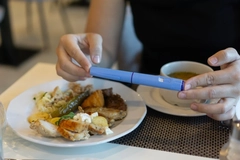
- Industry news
Industry news
- Category news
Category news
- Reports
- Key trends
- Multimedia
- Journal
- Events
- Suppliers
- Home
- Industry news
Industry news
- Category news
Category news
- Reports
- Key trends
- Multimedia
- Events
- Suppliers
Sustainable Foods Summit Hones in on Commodities and Food Authenticity

Taking place in Amsterdam for the fourth consecutive year, the summit aims to encourage sustainable sourcing of commodities and shed light on food authentication tools to combat food fraud.

3 April 2012 --- Sustainable commodities and food authenticity are focal themes of the European edition of the Sustainable Foods Summit (www.sustainablefoodssummit.com) on 7-8th June. Taking place in Amsterdam for the fourth consecutive year, the summit aims to encourage sustainable sourcing of commodities and shed light on food authentication tools to combat food fraud.
Sustainable commodities are a major theme because of growing concerns about the adverse impact of agricultural commodities on the environment and social communities. Popular methods of de-commoditising foods and ingredients by sustainable production will be explored. Dr. Ulrich Hoffmann, head of sustainable development at UNCTAD, will give details of a possible standard for sustainable commodities. The social impact of ethical sourcing will be discussed by Lee Byers from Fairtrade Labelling Organisation (FLO). Other papers in the sustainable commodities session cover transparency in the value chain, measuring environmental footprints, mitigating risks of sourcing, future direction of sustainable oils, and case studies involving coffee, tea, cocoa and fruits.
With growing incidents of fraud involving organic and sustainable foods, the summit has a dedicated session on food authenticity. The opening speaker outlines the various types of food fraud: adulteration, mislabelling, geographic origin, product substitution, counterfeiting, etc. The costs of food fraud on human health, consumer confidence, the environment and commerce is highlighted, followed by a detailed review of analytical tools and emerging technologies. Dr. Adrian Charlton from the Food and Environment Research Agency (FERA) gives a paper on novel authentication tools, whilst Dr. Pierre Ott from Ecocert looks at the application of such tools to provide traceability in the supply chain for organic foods. Details will be given on Earth observation techniques to target agricultural fields, and geo-traceability of organic & fair trade ingredients by sustainable indicators. Other papers cover new fingerprinting techniques, mass spectrometry and food isotopes, as well as emerging certification schemes.
The growing complexity of the sustainability challenge in the food industry is discussed in another session: pioneering sustainability initiatives. Key speakers will cover sustainable agriculture, biodiversity & benefit sharing, and sustainable supply chains.
Woolworths, a leading retail group in South Africa, will give details on how it has set up local sustainable agricultural projects via its Farming for the Future programme. By taking a holistic approach to farming, the projects have improved soil fertility whilst reducing agrochemical usage and conserving biodiversity.
Jan Dalsgaard Johannesen, Environment & Climate Director at Arla Foods, will state how the largest dairy company in Europe is meeting the sustainability challenge. Its 2020 Environmental Strategy has set targets for the entire life-cycle of dairy products: from farmers, transportation, processing, packaging through to distribution to consumers.
Robert van Otterdijk from the Food & Agricultural Organisation of the United Nations will look more closely at the role of distribution in waste reduction. According to his FAO UN study, about one third of food produced for human consumption is lost or wasted globally in the supply chain. Practical methods to improve efficiency in the supply chain and reduce food wastage will be discussed, whilst the proceeding paper will look at the role of packaging to address this sustainability issue.
With marketing increasingly making the difference between success and failure of new food products, the fourth session hones in on marketing & distribution innovations.
Lieven Callewaerd from Chainfood discusses the growing use of smart phone applications in meeting the informational needs of consumers. Katrine Milman, CSR Manager of Coop Denmark, will share the retail group’s perspectives on selecting and marketing sustainable foods. Coop is one of the largest food retailers in Scandinavia; more than half of Denmark’s organic food sales are from its network of over 1,000 stores.
Other papers will look at potential of sustainable foods in the HoReCa channel, novel distribution models, and consumer behaviour. Organised by Organic Monitor, the sixth edition of the Sustainable Foods Summit tackles broader issues related to sustainability compared to previous editions. By covering sustainable commodities and food authenticity, the summit highlights environmental and social impacts of agricultural production whilst highlighting tools to combat the growing threat of food fraud.










